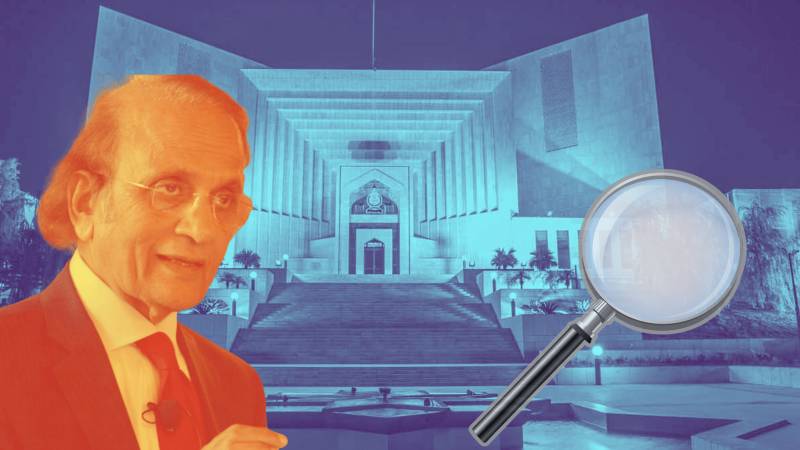
The federal cabinet on Saturday approved a proposal to form an inquiry commission to probe the serious allegations levelled by six judges of the Islamabad High Court against state institutions, accusing them of interference, intimidation and surveillance of judges.
It was decided that former chief justice of Pakistan, Justice (retired) Tassaduq Hussain Jillani, would head the commission and inquire into the allegations.
The cabinet also rejected the judges' allegations that the executive was interfering in the judiciary, and termed such allegations inappropriate. the cabinet reiterated its belief on the trichotomy of powers enshrined in the Constitution.
Terms of reference
The terms of reference (ToR) of the commission include:
- It will probe the veracity of the allegations contained in the letter.
- It will determine whether any officer was directly involved in interfering in the judiciary's affairs.
- The commission will recommend action against any agency, department or state institution based on the facts it determines.
- The commission will have the power to probe any other matter that it deems as important and related to the instant case.
Forming a commission
The proposal to form an inquiry commission came up for discussion in the federal cabinet after Prime Minister Shehabaz Sharif, Federal Law Minister Azam Nazir Tarar, and Attorney General of Pakistan Mansoor Usman Awan met with Chief Justice of Pakistan Qazi Faez Isa, Senior Puisne Judge Justice Mansoor Ali Shah, and the Supreme Court registrar earlier in the week to discuss the issue of the letter.
In the letter, the judges had alleged that their relatives had been kidnapped and tortured while others were facing direct interference and intimidation from certain security agencies. Surveillance equipment was also recovered from a judge's home, and videos were found on the recording device. Allegations were also levelled against IHC Chief Justice Aamer Farooq.
The letter was dispatched to the Chief Justice of Pakistan, who also serves as the chairman of the Supreme Judicial Council (SJC), and requested that a judicial convention be summoned over the allegations.
CJP Isa, however, summoned a full court meeting of the Supreme Court and invited all the judges of the IHC to share details of what they had experienced. A second meeting of the full court saw a majority consensus that CJP Isa should meet with the prime minister and raise the issues mentioned in the letter.
Thereafter, a meeting was held between Prime Minister Shehbaz and CJP Isa on Thursday, March 28, lasting for an hour and a half. During the meeting, CJP Isa clearly stated that "interference by the executive in the
affairs and judicial workings of judges will not be tolerated, and under no
circumstances can the independence of the judiciary be allowed to be compromised."
During the meeting, it was proposed that an inquiry commission under the Commissions of Inquiry Act, headed by a retired judge of "impeccable integrity," probe into the matter.
Probe will be a challenge: Jillani
Reacting to the news that he had been named as the head of the commission to probe allegations contained in a letter by six IHC judges, Justice (retired) Jillani said that the investigation will be a challenge.
"I am grateful that the Supreme Court and parliament have reposed their trust in me," he said, suggesting that he may have some insight into the thought process of judges and an idea of the kind of pressures that judges face since he too had once served as the chief justice of Pakistan.
"They have only just announced the formation of the commission, I have yet to see the ToRs of the commission," he said, adding, "I will commence inquiry after reviewing the ToRs."
Who is Justice (retired) Tassaduq Hussain Jillani?
Justice Tassaduq Hussain Jillani, born on July 6, 1949, in Multan, Pakistan, has left an indelible mark on the country's legal landscape.
After completing his education at Forman Christian College and the University of the Punjab, Justice Jillani pursued a course in Constitutional Law at the Institute of Advanced Legal Studies, London University. His legal career began in 1974, and he later served as the Advocate General of Punjab.
In 1994, Prime Minister Benazir Bhutto nominated him as a Justice of the Lahore High Court. His principled stance during former dictator General (retired) Pervez Musharraf's emergency rule in 2007, when he refused to take an oath, rendered his post nonfunctional. However, his commitment to upholding fundamental rights remained steadfast.
As a judge of the Supreme Court of Pakistan from 2004, Justice Jillani authored landmark decisions. Notably, he championed women's rights, addressed honour killings, and emphasized the right to education. His interpretation of religious freedom laws after the Peshawar church attack in 2013 garnered acclaim.
From December 2013 to July 2014, he served as the 21st Chief Justice of Pakistan. His tenure was marked by dedication to justice and the rule of law. In 2018, the Pakistan Peoples Party had proposed his name as caretaker prime minister but the proposal fell through after the Pakistan Tehreek-e-Insaf (PTI) did not agree to his appointment, citing apprehensions that he was related to former prime minister Yousaf Raza Gillani.

